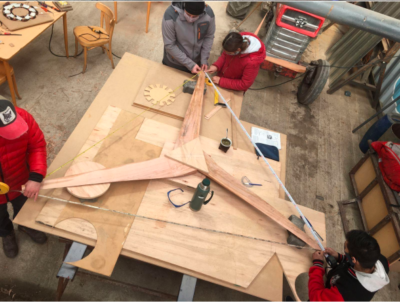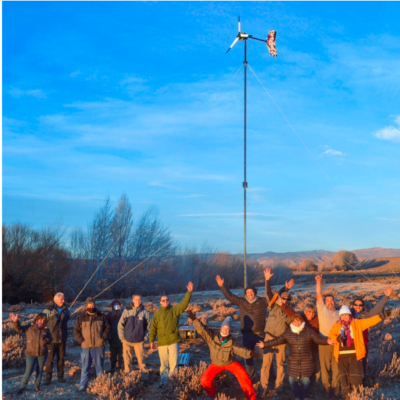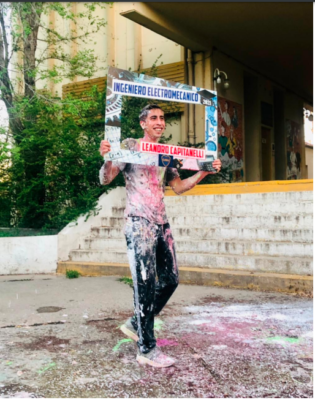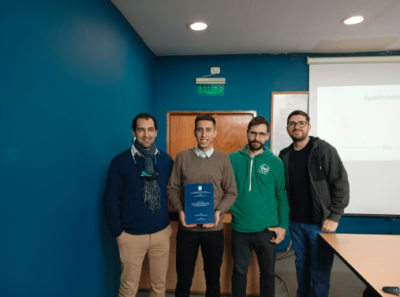Leandro Capitanelli, a recent electromechanic graduate, never knew how much a service learning project could positively affect him and his planned career path. He was introduced to an EPICS (Engineering Projects in Community Service) in IEEE project by a fellow colleague, and from there, he acquired an abundance of new knowledge.
The project, “Supporting Cooperative Production in Rural Economies with Small Wind Power and Open Technology,” focused on the development of an efficient water pumping system with renewable energy resources. The team was composed of students from Don Bosco High School, National University of San Luis (UNSL), as well as those from Appropriate Technologies Laboratory (LabTA). The team chose to work with the 500RPM Foundation for the development of renewable energies. Capitanelli was involved in the hands-on activities which took place in the Appropriate Technologies Laboratory (LabTA).
Due to the widespread lack of access to an electrical grid, many members of the rural community face financial and productivity difficulties. EPICS in IEEE granted $10,000 for the team to carry out their proposed solution.  The project seeks to strengthen the farming families of the Mapuche indigenous community, a community in rural Coralito, through renewable energies. Capitanelli was responsible for the development and deployment of the open technology system for this project.
The project seeks to strengthen the farming families of the Mapuche indigenous community, a community in rural Coralito, through renewable energies. Capitanelli was responsible for the development and deployment of the open technology system for this project.
Capitanelli was able to complete his supervised professional practices and later his final degree project, which coincided with this EPICS in IEEE project. In the LabTA, he was able to carry out multiple investigations in areas with which he was unfamiliar. For example, Capitanelli had to familiarize himself with the generation of electricity through renewable sources. This led him to utilize online resources, such as tutorials, as well as his academic colleagues. Thanks to these resources, he learned what the process of generating electrical energy through renewable sources looked like, which was a topic outside his undergraduate program.
The above-mentioned hands-on experiences allowed him to explore other areas he was unfamiliar with, such as programming. He did not have an opportunity to program at this level in his previous courses, so the programming required for this project was a bit challenging. Capitanelli was extremely proud once he finished programming the microcontroller, which will serve as extra protection for the wind turbine.
 The work Capitanelli completed in the lab was disseminated in technical schools, and the 500RPM Foundation was put in charge of working with the rural community in the field. The project was a success and it impacted the community greatly by installing a more efficient system that would save water and money, and increase farm production.
The work Capitanelli completed in the lab was disseminated in technical schools, and the 500RPM Foundation was put in charge of working with the rural community in the field. The project was a success and it impacted the community greatly by installing a more efficient system that would save water and money, and increase farm production.
Through this project, Capitanelli learned how to execute a project from start to finish while engaging with the local community to understand their needs. By looking at the problem through the lens of the community, he was able to create an impact beyond the classroom. The local community has been very enthusiastic about this positive transformation of their farming techniques and overall, their quality of life has been strengthened because of it. In addition, other communities and producers continue to contact the team to participate in a project in their community.
Capitanelli says the life lessons he learned from this project, especially in regard to rural areas and vulnerable communities, are undoubtedly important for his personal development. This project equipped him for a successful career, as he was able to put into practice all the knowledge he acquired from his academic career to solve an actual community problem. The interactions with the community led him to look at broad problems in a different way.

“A custom in Argentina, every time someone receives a degree, they usually throw flour, eggs, party supplies, wine, among others. This time, it’s my turn”

Photos with TFG directors: (from left to right) Ing. Gastón Frias, Leandro, Dr. Ing. Guillermo Catuogno, and Ing. Luis Torres

Recent Comments